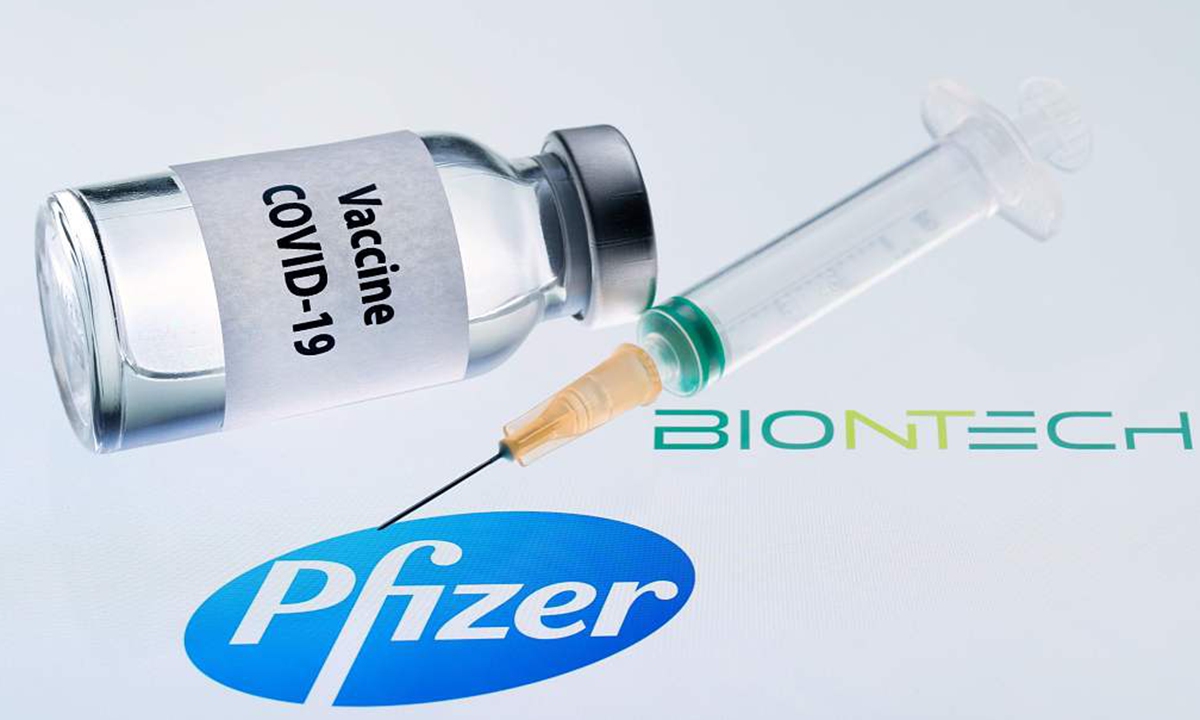 Pfizer Photo:VCG
Pfizer Photo:VCG
Could the Pfizer vaccine's real efficacy be as low as 19 percent, instead of 95 percent as it claims?
Questions raised by Peter Doshi, an assistant professor of pharmaceutical health services research at the University of Maryland School of Pharmacy, have triggered heated discussion on Chinese social media.
Doshi's opinion was disputed among Chinese vaccine experts interviewed by the Global Times. Many experts agreed that Pfizer should provide more raw data for peer review but said Doshi's methodology may be flawed.
Chinese experts also noted that disputes often arise from clinical trial data of COVID-19 vaccines, given the difference in participant groups and how different pharmaceutical companies define COVID-19 symptoms differently. They said that the efficacy rate of a vaccine should be evaluated in a more comprehensive manner, citing Sinovac as an example.
Sinovac vaccine received a 50.3-percent efficacy rate on Wednesday, based on phase III clinical trials in Brazil. But the figure was largely due to the fact that participants in Brazil are all medical workers with a very high infection risk, experts said.
Doshi on January 4 released an article on a blog platform under the UK pharmaceutical journal The BMJ, questioning Pfizer's efficacy rate.
Pfizer revealed that it discovered 170 PCR confirmed COVID-19 cases during the phase III clinical trials and 3,410 suspected cases in total.
However, if taking these suspected cases all as confirmed ones, the Pfizer vaccine's efficacy would be dramatically reduced to 19 percent. Even after omitting cases occurring within seven days of vaccination, which should include the majority of symptoms due to short-term vaccine reactogenicity, the efficacy rate remains as low as 29 percent, Doshi said in the article.
Doshi also questioned the standards of how Pfizer excluded cases and the influence of the use of medication on the vaccine's efficacy.
Doshi's comments triggered controversy on Chinese social media platforms, with some Chinese experts doubting Doshi's counting method for efficacy as he takes all participants showing symptoms to be confirmed COVID-19 cases, even if PRC tests show negative results.
"The PRC test is of very high sensitivity, 98.6 percent in the last year. But its sensitivity could be only 5 percent under Doshi's counting method," Zhuang Shilihe, a Guangzhou-based vaccine doctor, told the Global Times on Wednesday.
Zhuang noted that Doshi's doubts may be related to the anti-vaccine movement in the US, noting that Doshi has previously criticized other vaccines like the flu vaccines.
A Beijing-based vaccine expert who required anonymity expressed distrust of Pfizer's efficacy, but he did not directly comment on Doshi's doubts.
Despite different opinions on the Pfizer vaccine's efficacy, both experts said that Pfizer should reveal the raw data for peer review to better analyze the vaccine, so as to exclude the influence of any environmental or other elements on the efficacy.




